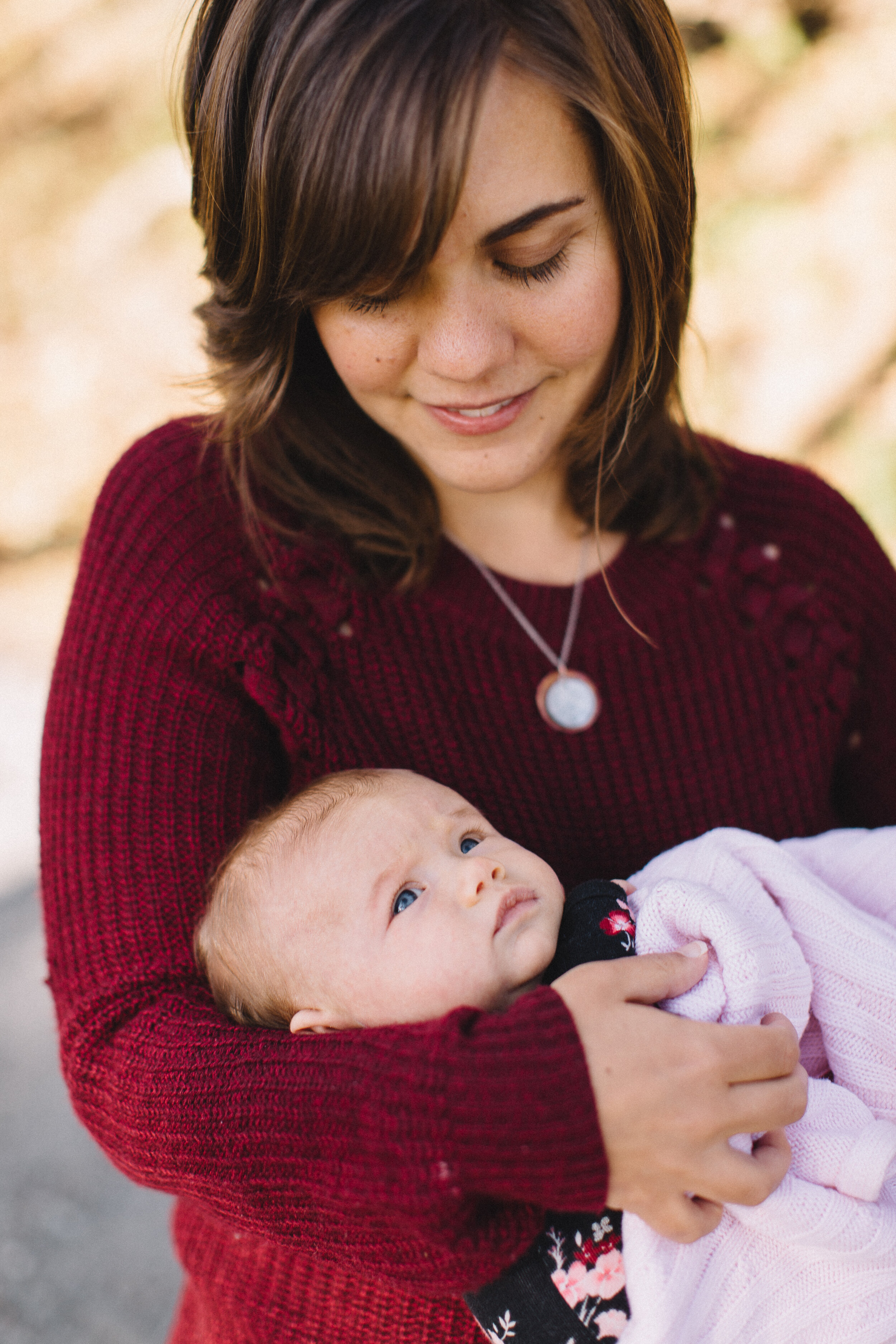The Secret of Contentment
Amanda Opelt holds her baby daughter Jane Augustine.
A NEW MOTHER’S PERSPECTIVE ON FINDING JOY AMONG THE THORNS
By Amanda Opelt
A few years ago, I started a “Read the Bible in a Year” program. I did well for the first few months, but, as many people who have attempted to read through the Bible have experienced, I felt bogged down a bit in the Levitical Law.
By the time I got to Ecclesiastes, I was well behind the original timeline, and I was worried. I was familiar with Ecclesiastes. I knew the book talked about the meaninglessness of life, the futility of work and striving, and, frankly, I was not in a good place to be meditating on that line of thinking.
Everything is Meaningless
I’d gone through a season at work and in my personal life that had left me weary. Goals and initiatives I had set out to complete were unsuccessful. Relationships I’d invested in had disappointed.
I’m a songwriter, and in spite of an enormous effort to produce quality work, I was in the midst of a severe bout of writer’s block. I was concerned that reading Ecclesiastes would send me headlong into a full-blown faith crisis. I didn’t need Solomon telling me life was futile; I was keenly aware of that on my own.
But rather than exasperating the problem, the poetry and prose I found in Ecclesiastes resonated with and comforted me more than any other time in my history of reading the scriptures. “’Meaningless, meaningless!’ says the Teacher. ‘Utterly meaningless! Everything is meaningless!’” (chapter 1, verse 2). “All things are wearisome, more than one can say” (verse 8). “So I hated life because the work that is done under the sun was grievous to me. All of it is meaningless, a chasing after the wind” (chapter 2, verse 17).
Solomon goes on to talk about the riches he acquires and the projects he sets out to complete, building houses and planting vineyards, constructing water reservoirs, and acquiring possessions. “What do people get for all the toil and anxious striving with which they labor under the sun? All their days their work is grief and pain; even at night their minds do not rest. This too is meaningless” (verse 22 and 23).
After reading these passages, I thought to myself, “This guy gets it! This is exactly how I’m feeling!” Something about my work felt so wearisome, so fruitless.
The Curse
This season in my life led me back to Genesis 3 where we find the pronouncement of the curse on Adam and Eve. It’s interesting to me that when most Christians think of the curse, they think about separation from God and the punishment of hell for those who are not in Christ.
We know those things are implications of the fall, but when God outlined the specifics of the curse, He spent most of His time talking about something else: He focuses on three things being cursed. The first is the serpent and his relationship with women; the second is the labor and childbearing experience; the third is work.
I’ve been thinking a lot this past summer about these things as well. I spent most of the summer pregnant with our first child, a little girl born on August 27th.
Overall, I had an easy pregnancy and labor, but I can still testify to the fact that the whole process does feel a bit cursed. Between pregnancy insomnia, nausea, swollen feet, and the screaming pain of contractions during labor, it’s hard to wrap your mind around how something so beautiful could come of something so painful and difficult.
I’ve also been thinking a lot about the curse due to an unfortunate run-in I had with a snake at the beginning of the summer. Let’s just say a pregnant woman can move fast when confronted by one of those creatures, and my husband Tim is a hero and expert snake-slayer.
The Curse of Work
But the curse of work is one we can all relate to no matter the season of life we are in. We’ve all been there: a proposal we’ve labored over for months is rejected by a boss at work, a garden we plant is uprooted by pesky rodents, a home we’ve renovated is damaged by flooding, a child we’ve loved and invested in turns away from the Lord, a friendship we pour into is cut off by a silly misunderstanding. As verse 18 of Genesis 3 says, we sow seeds and yet we reap “thorns and thistles”.
One of the most profound ways I’ve experienced this was over a year ago when a pregnancy ended in a painful miscarriage. Years of wanting to have children and doctor visits and working to get my health in a place where that would be possible suddenly seemed futile and pointless.
A seed had been planted and yet had withered and died before we could ever enjoy the fruit. I grieved in a way that only those who’ve experienced such a loss can understand.
Over the course of the last few years as I’ve wrestled with these things, I’ve learned a few lessons that have helped see me through. The first is to remember that it’s about God and not about you.
I’ve found that often the thing I’m most bitter about when a work project fails is the loss of the accolades I would have received had I succeeded. I wanted the affirmation. We live in a world that tells us our identity and value is tied up in what we can produce. We must reject that lie and the notion that what others think about us is who we are.
Trust God with the Outcome
I’ve also learned that Jesus calls us to faithfulness, not to success. The writer and theologian Eugene Peterson refers to this as “a long obedience in the same direction.”
When we are faithful to a task or an assignment God gives us, we may not always see the fruit of our labor, but we will always see the fruit of the Spirit in our lives: love, joy, peace, patience, kindness, goodness, faithfulness, gentleness, and self- control. And this is the most important fruit we can have in our lives.
Additionally, it’s vital that we remember to trust God with the outcome of our work. He is sovereign and He is in control. In Matthew 16:18, Jesus says that He will build His church and the gates of hell will not prevail against it.
So even if I’m not experiencing “success” in my little corner of the world, it doesn’t mean that the plans of God are being thwarted or the growth of the kingdom is being stunted. I have to trust God to do what He does in the way He wants to do it.
Celebrate and Rejoice
And finally, I think the most important thing I’ve learned is that when I am fortunate enough to see the fruit of my labor, I need to savor and celebrate that. That means every day when I come home and sit down to dinner, I thank God for the paycheck my work earned me that allowed me to buy this food. It means I enjoy the vacation that my job affords me. It means that when a ministry I’m a part of or a project I’ve worked on is successful, I savor that and give God the praise and glory.
I cherish each and every kiss on the face of my new little baby girl, for though the labor was hard, I would do it a thousand times just to have her in my life. Solomon even affirms this idea. He says “A person can do nothing better than to eat, drink, and find satisfaction in their own toil. This too, I see, is from the hand of God.” (chapter 2 verse 24) Or, as Paul puts it, “I have learned to be content in whatever the circumstances. I know what it is to be in need, and I know what it is to have plenty. I have learned the secret of being content in any and every situation, whether well fed or hungry, whether living in plenty or in want. I can do all things through Christ who strengthens me.” (Philippians 4:11-13)
Crown of Thorns
Every year my husband plants a garden, and every year I question the wisdom of that. Growing a garden in this mountain climate is risky. You never know when a late frost will kill the fragile seedlings. Heavy rains can oversaturate the ground. Forest creatures and pests can wreak havoc. But every year Tim takes the risk of planting knowing he may or may not reap the fruit of his labor. And I think it’s because Tim simply enjoys the experience of labor, he loves getting his hands in the dirt, and loves the journey of watching the seeds grow.
He trusts God with the outcome and rejoices over every little cherry tomato that slowly ripens on the vine. There have been years that we sowed seeds and reaped only thorns and thistles, but I’m reminded that when Jesus was crucified and bore the curse on His body for our souls, He was wearing a crown, not of gold or silver, but of thorns.
This article was originally written for the Winter 2019 Edition of The Journey magazine.

